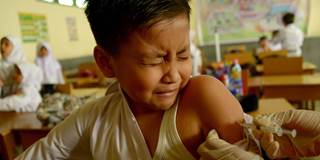A new study shows that developing countries could reduce poverty by targeting higher vaccination rates in poorer and more marginalized communities. Moreover, by making affordable, quality health care available to everyone, regardless of their income, immunization programs are an important step toward universal health-care coverage.
GENEVA – For most people, the choice between a life-threatening disease and a lifetime of crippling debt is no choice at all. Yet every year, hundreds of millions of people around the world are forced to make it, owing to the prohibitive cost of medical treatment. And, paradoxically, the hardest-hit people are not those with the largest medical bills, but rather those living in the poorest parts of the world.
Although countries like the United States have notoriously high treatment costs, with medical debt being one of the leading causes of personal bankruptcy, people living in poor countries actually spend more on health care costs relative to their income. And, because medical insurance is unavailable or too expensive, and because bankruptcy protection is not usually an option, too often they and their families end up being pushed into poverty.
But this tragedy – befalling some of the world’s most vulnerable people – could in many cases be entirely avoided. A new study, published in February in the journal Health Affairs, suggests that there is another option: in many cases, the medical bills can be preempted by prevention, through the widespread and affordable use of vaccines.

GENEVA – For most people, the choice between a life-threatening disease and a lifetime of crippling debt is no choice at all. Yet every year, hundreds of millions of people around the world are forced to make it, owing to the prohibitive cost of medical treatment. And, paradoxically, the hardest-hit people are not those with the largest medical bills, but rather those living in the poorest parts of the world.
Although countries like the United States have notoriously high treatment costs, with medical debt being one of the leading causes of personal bankruptcy, people living in poor countries actually spend more on health care costs relative to their income. And, because medical insurance is unavailable or too expensive, and because bankruptcy protection is not usually an option, too often they and their families end up being pushed into poverty.
But this tragedy – befalling some of the world’s most vulnerable people – could in many cases be entirely avoided. A new study, published in February in the journal Health Affairs, suggests that there is another option: in many cases, the medical bills can be preempted by prevention, through the widespread and affordable use of vaccines.